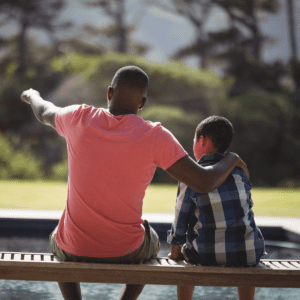When something scary happens in your home, community, or in the world, your child will look to you to help understand it. Having honest, developmentally-appropriate conversations with your child can help them develop coping skills, lessen the impact of strong negative feelings like anxiety or fear, and help them heal and grow.
For most children and teens

After a crisis, most children and teens need their parents and caregivers to:
- Validate their feelings. When we validate someone else’s feelings, we let them know their feelings are normal, accepted, and don’t change our love for them. This can sound like, “Seeing that fire was really scary. It made me feel nervous, too.” or “I can understand that hearing us yell like that might have been really confusing.”
- Help them identify their feelings. Naming feelings can help children build their emotional literacy, use coping skills, and better understand themselves. You can say things to help them notice their feelings like, “I can see that hearing about that shooting made you feel really nervous to go outside. Want to talk about it?” or “You’re throwing things, and that makes me think that hearing about Junior’s accident made you feel angry and out of control. Cuddling usually helps you when you’re mad. Should we try?”
- Ask them what they know. This can help us get an accurate understanding of what they might be thinking, feeling, or wondering about. You can say things like, “Your teacher told me something scary happened at school today. Can you tell me about what happened?” or “I noticed you were listening really closely to the radio report this morning. What did you hear about?”
- Limit news or media exposure to the event, especially for young and school-aged children. Continued exposure to scary or violent pictures or video can increase anxiety and fear. If you think it’s appropriate for them to hear updates about the event, talk to them about it yourself so that you can help them understand what’s going on.
- Identify the helpers. Hearing about pain and suffering can cause us all to feel fear, anger, or a loss of control. Noticing the good that exists in the world, and that there are people who offer love, support, and care during crisis is an important part of healing and growth.
- Use simple, honest, developmentally–appropriate language. When children hear something that is difficult for them to understand, they may fill in the gaps with their own ideas, which may be worse than reality and cause more anxiety. For this reason, it’s important to give children honest information that they can understand, and give them the opportunity to ask questions.
For Younger Children

In addition to the above suggestions, you can support children under age 7 or so by offering extra reassurance and attention following a crisis.
- Reassure them they are safe. Though there are limits to how much control we have over safety, we can reassure children that they are safe in the moment, loved, and looked after.
- Offer extra attention and love. This might include more time playing together, cuddling, and doing things you both enjoy.
- When you leave them, be sure to let them know where you are going and when you’ll be back.
For School-Aged Children
Extra love and reassurance is important for this age group as well. You can also support your school-aged child by:
- Ask them what they know and how they feel about it. You might say something like, “I noticed you were listening to me talk to the neighbor. What did you hear us talk about? What questions do you have?” or “How are you feeling after seeing that on the news?”
- Help them name and express their feelings. It’s normal to have a range of reactions to something scary, overwhelming, or confusing. You can help your child make sense of this by normalizing it and helping them name or express their feelings. You can do this by encouraging them to draw or write about their experience, or notice what you’re seeing. This might sound like, “You seem to be really quiet since yesterday, and I’m wondering if you’re feeling scared. What do you think?”
- Identify the helpers, and help them identify how to find helpers. In addition to talking about who in their community is helping after a crisis, you can help your child feel safer by talking to them about what they can do if they’re in an unsafe situation. This might sound something like, “I know it was scary when you couldn’t find me at the fair. If that every happens again, you should find a grownup in charge and stay where you are” or “Hearing about that school shooting was really scary. Let’s talk about what you know about keeping yourself safe.”
For Teenagers

Teenagers can be less likely to reach out to their parents for support after a crisis, but you can still support them by keeping yourself available and being available. You can also:
- Teach them that all feelings are OK, and help them find safe ways of expressing those feelings. Crises can bring up big, complicated feelings, and teenagers feel very deeply. Oftentimes stress and challenge can push teens to either isolate or engage in risky behaviors. Teaching healthy ways of coping is an important part of helping your teen navigate difficult situations. This might be encouraging them to use exercise or movement to deal with big feelings, to spend time with friends, or to do activities that bring them joy.
- Encourage them to stay connected with friends. Teens look to their friends for comfort and understanding, and spending time with friends can help teens feel safe and loved.
- Ask open-ended questions to explore their experiences, feelings, and worries. This might sound like, “What was that like for you?” or “What are you most worried about now?” or “How can I help?”
- Be mindful of how much media coverage of the event they are watching or following on social media. Teens may have more independent access to media than younger children. If limiting this isn’t right for your family, keep the lines of communication open by asking them about what they’re watching and wondering about. You can also help them notice whether looking at that content is making them feel better or worse.
When to Worry

It is normal for children and teens to have emotional and physical reactions to stressful situations. Depending on the situation, your child’s reaction may last only a few hours, a few days, or much longer than that. You may notice that your child is:
- More clingy or demanding.
- More withdrawn or more hyperactive than usual.
- More irritable, tearful, fearful, or more likely to have outbursts or tantrums.
- Showing regressive behavior, or doing things more typical of younger children. This might be behaviors like bedwetting, tantrumming, or “baby talk.”
While these are normal reactions to stress, change, and strong feelings, you know your child best. If you notice any of these signs for a prolonged period, or if you’re worried for your child’s health or safety, reach out to a medical professional.
For more information about supporting children and teens through crisis and trauma, visit the National Child Traumatic Stress Network, or the Child Mind Institute.
